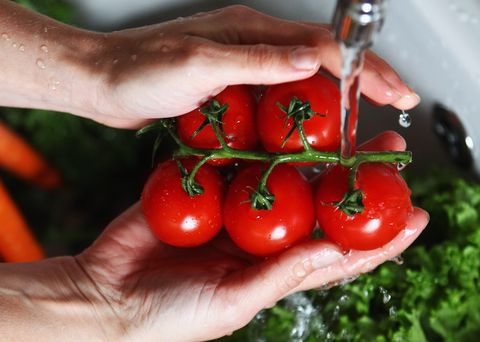
Joern PollexGetty Images
The news around the COVID-19 outbreak is constantly changing, but information about food safety and how to keep yourself healthy is crucial right now. Here is a comprehensive list on the foods you should be stocking up on during this period of social distancing, as well as information about your local grocery stores’ changing hours, an explanation of “no-contact delivery,” and a guide on how to help your community and its businesses throughout closures.
In the midst of the coronavirus outbreak it’s more important than ever to practice good hygiene and proper food safety. This means, as always, washing your hands frequently, checking expiration dates, and making sure your food is cooked to a safe temperature. But when it comes to eating raw produce, things can seem a little dicier. Thankfully, it seems like the food safety rules you should have been following all along will hold up here.
First off, it’s important to note that the FDA’s current position is that “there is no evidence to suggest that food produced in the United States can transmit COVID-19.” Furthermore, they went on to say that there is “no evidence of food or food packaging being associated with transmission of COVID-19.”
Still, raw fruits and veggies obviously don’t have the benefit of being heated up, which can kill bacteria and pathogens. You also obviously shouldn’t wipe them down with disinfectant wipes like you can with boxes and bags of packaged food. So here are a few tips you should follow.
VP of marketing at Naturipe Farms CarrieAnn Arias told us that first and foremost, when you get back from the grocery store, you need to wash your hands. You should also do it before you go…and after putting away your food.
Then, fruits and veggies should be rinsed with water. Yes, lots of running water is all you need.
“Washing your fruits and vegetables under running water is always recommended, even if it has a peel you will be discarding like our avocados,” she said. “Don’t use soap, detergents or bleach solutions. When it comes to berries, you will want to rinse in cool running water before serving.”
This advice echos those given by other experts too, including chief culinary officer at Rouxbe Ken Rubin.
“The best practices for washing fruits and vegetables has not changed or been revised in light of the COVID-19 pandemic,” he said. “The same principles that have always been true still apply.”
Even with the threat of coronavirus, washing your produce with lots of water is all that’s recommended, but if you really feel like you’d like an extra safety net, you can also use a vinegar and water solution made with three parts water and one part vinegar, as outlined in NPR, if you want them to be extra clean.
“If you are uneasy or uncertain, just buy varieties of produce that you can either peel at home (like bananas, oranges, mangoes or avocados) or choose products that you will cook,” Rubin added.
As long as you wash your hands, avoid cross contamination, and only eat produce that does not show signs of spoilage, you can and should be eating fruits and veggies right now.
“Raw veggies and fruits are safe to eat, especially right now,” Arias said. “They are packed with nutrition and essential vitamins that can aid in boosting our energy and immune system.”


